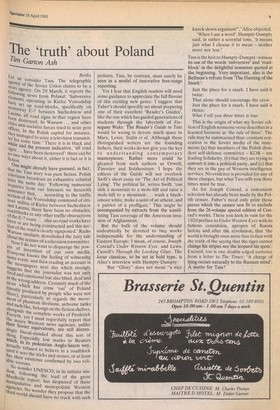The 'truth' about Poland
Tim Garton Ash
Berlin Let us consider Tass. The telegraphic agency of the Soviet Union claims to be a tiews agency. On 29 March, it reports the r `niluwing news from Poland: 'Subversive elements operating in Kielce Voivodship have Set up road-blocks, specifically on motorway E-7 between Suchedniow and Laczna, all road signs in. that region have been destroyed, In Warsaw ... and other cities anti-socialist forces tried to seize post 13,,ffiees. In the Polish capital for instance, they managed to seize a television transmitter for some time.' There it is in black and White and the present indicative, 'all road ighs • • have.been destroyed': there can be nci two ways about it, either it is fact or it is fiction. One might already have guessed, in fact, that the Tass story was pure fiction. Polish television broadcast an exhaustive rebuttal_ later the same day: 'Following numerous inquiries from our listeners we herewith announce that, according to the traffic section of the Voivodship command of citizens' militia of Kielce between Suchedniow and Laczna, there have been no obstacles, road blocks or any other traffic obstructions of the E-7 route . . also no road works have .h.een or are being constructed and this section of the road is clearly signposted.' Radio Warsaw similarly demolished the fairy tale about the seizure of a television transmitter. Now I do not want to disparage the powers of invention of our own media. Everyone knows the feeling of witnessing some event, and then reading an account in the newspapers next day which strongly snggests that the journalist was not only tired and emotional but also blind, deaf and at the wrong address. Certainly much of the news which has come 'out' of Poland (mostly produced by people who were not "'ere), particularly as regards the movement of phantom divisions, airborne tanks and such like, belongs on the fiction shelves, a_longside the complete works of Frederick F.orsyth, yet I must regretfully report that the major Western news agencies, unlike their Soviet equivalents, 'are still distressingly literal-minded about this sort of thing' Especially low marks to Reuters Which, in its pedestrian Anglo-Saxon way, actually refused to believe in a roadblock has it sees the sticks and stones, or at least has their existence confirmed by two reliable sources. __, No wonder UNESCO, in its infinite wisdom, following the lead of the great MacBricle report, has despaired of these arnartipulative and monopolistic Western _gencies. No wonder they propose that the third world should have no truck with such pedants. Tass, by contrast, must surely be seen as a model of innovative free-range reporting.
Yet [fear that English readers will need some guidance to appreciate the full flavour of this exciting new genre. I suggest that Faber's should speedily set about preparing one of their excellent 'Reader's Guides', like the one which has guided generations of students through the labyrinth of Finnegan,s Wake. The Reader's Guide to Tass would be wrong to devote much space to Marx, Lenin, Stalin et al. Although these distinguished writers are the founding fathers, their works do not give you the key to understanding contemporary masterpieces. Rather more could be gleaned from such authors as Orwell. Zinoviev and Solzhenitsyn. I hope the editors of the Guide will not overlook Swift's short essay on 'The Art of Political Lying'. The political lie, writes Swift, 'can sink a mountain to a mole-hill and raise a mole-hill to a mountain . .. wash a blackamoor white, make a saint of an atheist, and a patriot of a profligate.' This might be accompanied by extracts from the scintillating Tass coverage of the American invasion of Afghanistan.
But the bulk of the volume should undoubtedly be devoted to two works indispensable for the understanding of Eastern Europe: I mean, of course, Joseph Conrad's Under Western Eyes, and Lewis Carroll's Through the Looking Glass. The kcus classicus, to be set in bold type, is Alice's interview with Humpty-Dumpty: 'But "Glory" does not mean "a nice knock-down argument",' Alice objected.
'When I use a word', Humpty-Dumpty said, in rather a scornful tone, 'it means just what I choose it to mean — neither more nor less.'
Tass is the heir to Humpty-Dumpty: witness its use of the words 'subversive' and 'roadblock' in the delightful nonsense quoted at the beginning. Very important, also is the Bellman's refrain from 'The Hunting of the Snark': Just the place for a snark. I have said it twice: That alone should encourage the crew. Just the place for a snark. I have said it thrice: What I tell you three times is true This is the origin of what my Soviet edition of English nonsense verse describes in a learned footnote as 'the rule of three'. The rule may be summarised thus: constant reiteration in the Soviet media of the statements (a) that members of the Polish dissident self-defence committee — KOR — are leading Solidarity, (b) that they are trying to convert it into a political party, and (c) that they are in the pay of Western intelligence services. No evidence is provided for any of these charges, hut what Tass tells you three times must be true.
As for Joseph Conrad, a convenient selection has already been made by the Polish censor. Faber's need only print those pieces which the censor saw fit to exclude from the 26-volume special edition of Conrad's works. There you look in vain for the 1920 preface to Under Western Eyes with its famous conculsion, apropos of Russia before and after the revolution, that 'the world is brought once more face to face with the truth of the saying that the tiger cannot change his stripes nor the leopard his spots'. Excised, too is one double-edged sentence from a letter to The Times: 'A charge of lying occurs naturally to the Russian mind'. A motto for Tass?






































 Previous page
Previous page